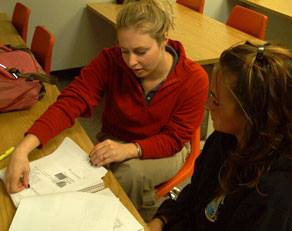Tutoring Center Offers Help to Struggling Students
The spring semester can be described as the rude awakening after the easy sleep of the fall semester. Times were good in the fall – laughs were plentiful, weather welcoming, and fun times never lacking. Then finals came, final grades parading behind with flaming torches. Your dreams of making the Dean’s List were set ablaze. Suddenly, classes weren’t so easy, and your grades slipped. You’re not happy with your situation. Maybe you even found yourself on academic probation. Help seems elusive; it doesn’t seem like anyone or anything can help you get that A or B that you desperately want. Fear not! Several wonderful resources lay right at your fingertips that can help you boost your grades. The Tutoring Center and PAL Program are at your disposal, free of charge.
The Tutoring Center, located in Pullen Hall 139 and 151, offers writing, math, and content tutoring in specific 100- and 200- level courses. The Tutoring Center provides one-on-one peer tutoring that is subject driven, though there is some tutoring on study strategies. The Tutoring Center offers help with all writing courses, most math courses, and several sciences courses, including BIO 109/149, GEO 103, CHEM 103/201/202. The Tutoring Center employs 61 student tutors who served 426 students in the Fall 2015 semester, according to Mark Smith, director of the Tutoring Center.
The Peer Assisted Learning Leader (PAL) Program is part of the Programs Advancing Student Success (PASS) Office, and is located in Pullen 150. The program became fully implemented in the beginning of the Fall 2015 semester. The PAL Program is the sister center of the Tutoring Center. While the Tutoring Center provides tutoring on specific content, the PALs provide tutoring on how to succeed academically. According to program director Harriet Douglas, the PAL program is “designed to provide help to students who want to improve their study strategies, time/workload management, and note-taking and test-preparation skills” and “provide[s] assistance to students who [are] having difficulty with courses in the social sciences, arts, and humanities.”
To put it more simply, the PAL Program is designed to help students study better, not harder. Like individual content tutors, PALs are Frostburg State University students. The six students who are currently employed as Peer Assisted Learning Leaders (PALs) helped serve 48 students in the Fall 2015 semester.
“For a small regional school to have this level of academic support is fantastic,” said Smith. In the Fall 2015 semester, the Tutoring Center and PAL Program provided 1,828 hours of support to students, with a total of 1,518 visits. Between these two programs, 115 courses are tutored. Significantly, students who had a mid-term warning and visited the Tutoring Center/PAL Program five or more times passed the course with a ‘D’ or better, according to Mr. Smith.
One of the benefits of the Tutoring Center and particularly the PAL Program is that students who seek help “learn academic and time management behaviors and habits that will continue to help them be successful students throughout their college careers,” as Douglas explained.
Despite the staggering number of students these programs have helped, there are still students who do not seek needed help or do not return for subsequent help. There are several reasons this may occur. Students could deny that they could benefit from tutoring, or they may not be aware that the programs exist. Students could also be wary of assistance coming from peers, rather than an adult faculty member. But Smith argued that there are great benefits to peer tutoring.
“It promotes learning; that’s probably the best part,” Smith said. He went on to explain that it also builds confidence and critical thinking, and that a mentoring relationship is developed between students.
Kaitlyn Roush, a sophomore at FSU who works for the Tutoring Center and the PAL Program, explained the benefits of peer tutoring.
“I can relate to the students I am tutoring more easily,” Roush said. “I have taken the courses recently, had the same instructor, and even some of the same stumbling blocks when it comes to learning certain topics. When I tutor other students I make sure to let them know that I had my own struggles but I spoke to the professor and put in hours of studying or reading textbooks and was able to succeed. My hope is that it will inspire them to try as hard as possible to meet their educational goals.”
“We’re nice and don’t bite, I promise!” said Roush.
There are other steps students can take beyond working with a tutor or PAL, such as visiting their professor’s office hours, which are designed to assist students. Professors are often an underutilized source of help, and are generally more than willing to provide students with a little extra help to understand the content. Asking for clarification on a subject or assignment often goes a long way to improving a student’s grade.
Online resources also exist that can help students succeed, such as Khan Academy. According to the Khan Academy website, they offer free “practice exercises, instructional videos, and a personalized learning dashboard that empower learners to study at their own pace in and outside of the classroom.” Subjects include “math, science, computer programming, history, art history, economics, and more.” The Tutoring Center’s website links students to a number of instructional videos, including tips on how to stay focused while studying, effective studying, and writing tips. Links are also provided for select content areas, such as biology, technical writing, and accounting.
Sustaining a desirable GPA can take time and hard work. The good news is that students at Frostburg State University do not have to shoulder the work alone. The peer tutors and PALs are waiting to help students.
“Students should know that it’s here, that it’s free, and that it’s proven to be effective,” Smith said.





1 Comment